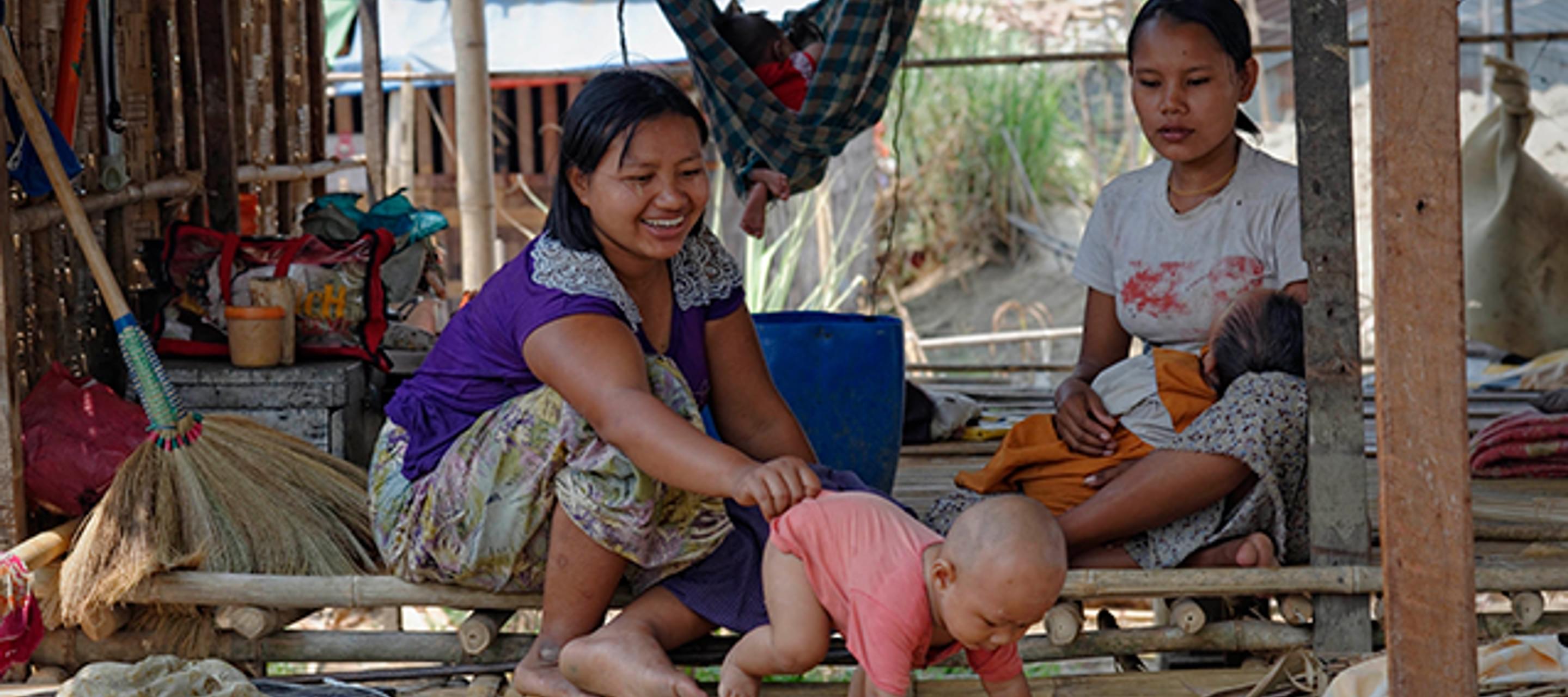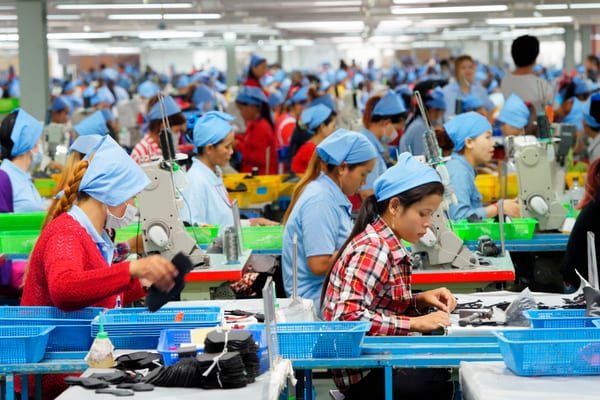Development Denied – Recruitment Fees Eroding Migrant Worker Remittances (Pt 5)
5 August 2020

COVID-19 and Migrant Workers
As part of our continuing focus on the links between COVID-19 and the business and human rights agenda, IHRB is exploring the impact of the pandemic on migrant workers across Asia and the roles and responsibilities of businesses in addressing these challenges. Most of the 35million+ migrant workers estimated to live and work in the Gulf Cooperation Council (GCC) countries are from Africa or South and Southeast Asia. Across the Association of Southeast Asian Nations (ASEAN) states, an estimated 10 million migrant workers live and work in major destinations such as Malaysia, Singapore, and Thailand. During the pandemic, countries in the GCC and Singapore were ranked in the top ten for infection rates per million, and almost all cases were from migrant workers living in dormitories.
This five part series begins with an overview of the range of challenges facing migrant workers throughout South East Asia as a result of the ongoing COVID-19 pandemic. Subsequent pieces in the series will cover accommodation conditions, discrimination issues, recruitment fees and wage theft, as well as impacts to migrant workers’ remittances back home.
Many migrant workers across Asia are employed in the global supply chains of international companies, adding significantly to the economic vitality of the countries where they find employment. At the same time, countries of origin benefit through the wages migrant workers send back home to their families (known as “remittances”).
These remittances constitute a significant safety net for many households, often reaching to extended family and friends as well. Remittances support local communities and economies through payments for housing, education, healthcare, as well as local shops and other businesses, easing day-to-day hardship and poverty.
Significant Sums
Last year global monetary transfers from migrant workers and others reached a record high of $554 billion.
As the COVID-induced economic crisis hits host countries, economists are bracing for the impact on this year's figures. Millions of migrant workers have lost work or suddenly found themselves in situations of unpaid or reduced wages. The World Bank released a study in April on South Asia, noting the impact of the pandemic on low-waged and low-skilled workers caused by weakened economic activity, decreasing trade, and added strain on the financial and banking sectors. The IMF also identifies potential downturns in some Gulf states to trigger large-scale loss of low paid work and driving a mass exodus of migrant labour from the Middle East, North Africa, and Southeast Asia.
By the end of this year, remittance flows to low and middle-income countries are projected to fall 19.7 percent, to $445 billion, the sharpest decline in recent history.
These workers are likely to join the jobless in their home countries, already facing high unemployment and deep poverty. They often do not receive employer insurance coverage, and are mostly excluded from social welfare and emergency relief programmes in host countries. With limited safety nets in place, this has left many unable to remit money home, as they struggle to cover their own costs of living.
By the end of this year, remittance flows to low and middle-income countries are projected to fall 19.7 percent, to $445 billion, the sharpest decline in recent history.
It's Getting Harder for Migrants to Move Their Money
The impact on specific countries is likely to be significant. Up to 400,000 Filipino migrant workers for example are projected to lose their jobs or take a pay cut this year, despite contributing $33.5 billion of remittances last year. In India, at least 50,000 workers have returned home since early May, cutting into the income migrant workers from India and Pakistan bring home each year (last year, that was $100 billion). And as hundreds of thousands of Bangladeshi workers living abroad lost their jobs this year, their families are seeing a 25% decrease in money sent back home.
Access to remittance services have also been disrupted by lockdowns and movement restrictions, even if migrant workers have funds to remit home. Many agent locations in both sending and receiving countries have been considered non-essential businesses and made to close or operate within restricted hours. While digital payment could have been an alternative solution, a lack of digital financial literacy coupled with mobility access challenges have hindered these efforts.
Governments could be instrumental in pushing for the digitisation of wage payments and encourage remitting through digital means.
Moreover, such services are not yet available in many markets and migrant workers often lack the required documents to open accounts.
Governments could be instrumental in pushing for the digitisation of wage payments and encourage remitting through digital means. Employers should shift to digital wage payments, as the majority of wages to migrant workers are currently disbursed in cash. Wages received directly into a digital account could be sent straight into the account of a family member back home. The remittances industry could also expand its offerings with connected services to mobile payment channels and other innovative financial products tailored to the last mile, such as micro-loans and micro-insurance products, which could help migrants in this time of crisis. The UNCDF has some innovative ideas and scalable approaches here for remittance service providers and policymakers.
Recruitment Fees Were Undermining Remittances Even Before COVID
Migrant workers having to pay their recruitment fees and associated costs presents one of several challenges to remittance flows. Even as countries of origin explore new markets for the deployment of migrant workers, the value and development potential of remittance inflows is eroded through the endemic practice of charging migrant workers recruitment fee payments and associated charges in order to secure their jobs abroad.
Low-waged and low-skilled migrant jobseekers desperate to secure employment are especially vulnerable to recruitment malpractice, including exorbitant recruitment fees. In many origin and destination countries, the recruitment fees charged are far higher than the actual costs they are supposed to reflect, sometimes compounded by interest accrued on loans for initial payments (usually at exorbitant rates and other hidden charges), leaving workers trapped in cycles of debt bondage and at greater risk of forced labour, debt bondage, and human trafficking.
An estimated US$1.4 billion can be attributed to illegal recruitment fees to workers.
An estimated US$1.4 billion can be attributed to illegal recruitment fees to workers. Research by Verité found workers in Southeast Asia pay on average between $500 to $1,200 each in recruitment fees, while the average monthly wage for a worker in an electronics factory was $278. Clearing recruitment debt can take a worker up to two years.
These practices have a major socio-economic development impact – by significantly weakening remittances for many low-income countries – on a scale often exceeding international governmental aid. Such practices severely restrict the development potential of remitted earnings, because funds intended for development – individual or societal – are instead diverted to service recruitment fees, debt, and associated charges. This is emphasised in United Nations Sustainable Development Goals Indicator 10.7.1:
“The high economic and social costs incurred by migrants are increasingly recognized as serious impediments to realizing sustainable development outcomes from international migration. A critical role of migration policies is reducing the financial costs of recruitment incurred by migrant workers seeking jobs abroad. Recruitment costs paid by migrant workers to recruitment agents, on top of the fees paid by the employers, are a major drain on poor migrants’ incomes and remittances. They divert the money sent by migrants from the family to illicit recruitment agents and money lenders. Almost 10 million people use regular channels to migrate in search of employment every year. A large number of them pay illegal recruitment fees to the recruitment agents.”
The Business Case is Clear
The mainstreaming and embedding of a new business model, one where the employer – not the worker – pays the costs of recruitment (known as the Employer Pays Principle) has the potential to invert the cycle of debt to one of regenerative and distributive income generation. This would benefit all actors involved in the recruitment cycle:
- Migrant workers will incur less debt and be less vulnerable to situations of forced labour due to heavy debt liabilities, and less inclined to pursue unsafe and irregular migration channels.
- Brands and suppliers will benefit by minimising risk through a more stable and resilient workforce in their supply chains and from a recruitment process that produces a motivated and more satisfied workforce.
- Destination countries will see bigger gains to economic growth when migrant workers have more money to spend.
- Countries of origin, through remittances, will see investments in the education of children, increased access to medical services, and productive investments – all contributions to local and national development goals.
Global uptake of the Employer Pays Principle would also contribute to socio-economic development in workers’ home countries through higher remittances as a result of embedding more secure and sustainable livelihoods into the migration system. This will be a focus of the Leadership Group for Responsible Recruitment in the years to come, including economic activity generated by migrant workers, the value of remittances, and the impact of flawed recruitment practices and worker debt on development outcomes.
Global uptake of responsible recruitment needs acceleration – through efficiencies in sharing tools, services, best practice cases, elevating worker voices, providing legal support, and holding companies to account for their commitments. Employers and recruiters also need support to embed responsible recruitment commitments into their policies and systems, as outlined by IHRB’s Dhaka Principles and other international standards such as the IOM's IRIS and the ILO's Fair Recruitment Initiative.
As global business comes out of lockdown and seeks to get moving again, there is an opportunity to create new incentives for improvements in recruitment models and responsible business practices. Safe, orderly migration and responsible recruitment practices in line with human rights standards, with the eradication of worker paid recruitment models, have the potential to deliver positive development outcomes for migrants, their families and local communities, as well as countries of origin and destination.
Image: ILO




